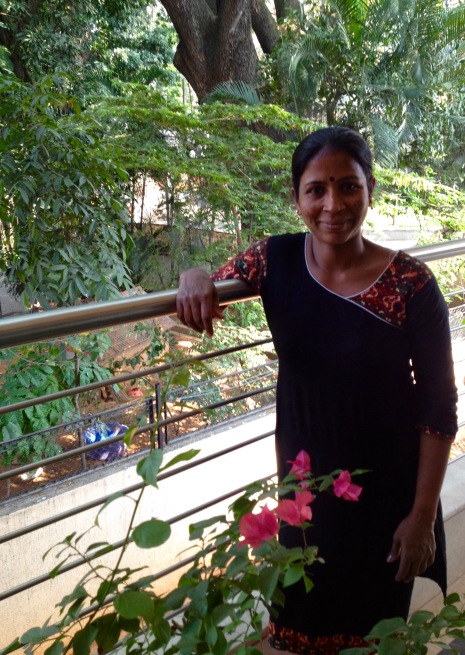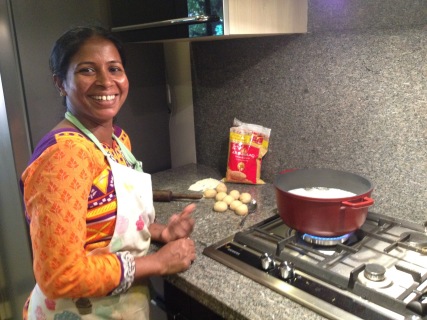 Priya’s story has revealed itself gradually; snippets of conversation as we’ve come to know each other in our one year in India. I have known since she joined us as housekeeper, that Priya is widowed and raising children alone. This in itself, could be considered remarkable in India.
Priya’s story has revealed itself gradually; snippets of conversation as we’ve come to know each other in our one year in India. I have known since she joined us as housekeeper, that Priya is widowed and raising children alone. This in itself, could be considered remarkable in India.
It is not uncommon for widows in India to be considered inauspicious and shameful to their family. They can be marginalized, cut off from family property and money, and considered an inconvenience and a burden. Widows can be abandoned with no place to go – simply cast adrift.
Traditionally, widows are expected to wear white, shave their heads and discard their jewellery – essentially renouncing anything that symbolizes womanhood. In some areas of India, social norms still hold to the belief that for a bereaved woman to remain in society, she must have a supportive brother or son.
In rural parts of India, where arranged marriages commit young women (often girls) to marry older men, it is not surprising that widows comprise ten percent of the adult female population, some forty million. Many, widowed at a young age, find that their life is essentially over or irrevocably altered. It can still be considered improper for upper castes to remarry, lower castes often do, ideally to a brother-in-law.
To understand their plight one has only to read about or see images of Vrindavan, a sacred city which has become home to thousands of destitute widows. Begging to pilgrims and chanting bhajan (sharing) hymns for up to four hours a day, earns them enough for one meal and perhaps shelter. For young widows in Vrindavan, poverty may lead to sexual exploitation, a last resort for those already stripped of their dignity. The organization Maitri endeavours to alleviate this, collecting contributions for the purchase of mosquito nets, fresh white linen saris (perhaps now a symbol of sisterhood) and even sewing machines for a widow’s livelihood.
The abhorrent practise of shunning widows is a grim residue of an Indian tradition sati or suttee, the burning of a widow on her husband’s funeral pyres which was once (and by some accounts is still) practiced. The perception of woman as chattel is rooted in the patriarchal culture which must change, in step with the values of a civilized society. The women at Vrindavan and other shunned widows represent all women. They were once girls, wives, mothers and grandmothers – deserving respect and dignity.
Within this cultural context, Priya’s independence and resolve is all the more admirable. She has mentioned to me that she is very careful not to acknowledge that she is on her own.
Priya was somewhat distracted this past month as her search for a new home was far more difficult to secure without a man’s name on the lease. Our offer to help negotiate was politely declined and I was relieved that a driver of another family Priya works for was available to help.
Thankfully Priya has found a new home, one with tiled floors and running water, an improvement from her previous house. However, she is not pleased that so many cows wander close by and she worried that her previous landlord might take advantage by not returning her security deposit, “Madam, this is life without a man, not easy,” she said stoically.
Recently as I relaxed, reading on my sofa, Priya eased herself down on the carpet beside me. We had just arrived home from a trip, the house was already clean and I was happy to have some time to speak with her. Priya’s brave and inspiring story flowed forth. With her resilience worn firmly on her face and her engaging personality coming through, her reflections evoked introspection, wistfulness and even laughter.
I use Priya’s own speech patterns. Madam is usually said with a Ma..dam, the last syllable lilting up lyrically as if it is a happy topic. Otherwise, the dam dips down with a tone of seriousness…it is the name she uses for me.
Priya where did you grow up? I am not from here, from Tamil Nadu. We lived in a house of coconut leaves with mud floor, like a squatter’s village. We had no food, maybe gravy with onions and rice, once at night. I tell my children,”You are lucky.”
Did your father work? He died, I was five. Preya puts her thumb to her mouth like a soother, indicating that her father was an alcoholic. Four other children, never enough food.
Did your mother work then and take care of you all? She worked in rice fields, taking the husk. Very hard work Madam, 6 rupees a day.
Your older brothers and sisters, did they go to school? No, no, no one. Sisters from a convent came to take me, so poor were we Madam. My mother said, “Take her for better life.”
 How did you feel, do you remember this? Oh yes, I was happy. Food was there. The bus ride was far, to Kerala, a convent. Sister Paulina took me. You know Madam, Priya gazes out to the lush rain tree and palm trees beyond for inspiration, coconut leaves were rolled long for lights (torch). Moved back and forth, very pretty at night. And spoons from jackfruit, we eat rice, lots of rice and coconut chutney always there. Priya smiles with the memory of this and I tell her I love this kind of chutney. Oh yes Madam!
How did you feel, do you remember this? Oh yes, I was happy. Food was there. The bus ride was far, to Kerala, a convent. Sister Paulina took me. You know Madam, Priya gazes out to the lush rain tree and palm trees beyond for inspiration, coconut leaves were rolled long for lights (torch). Moved back and forth, very pretty at night. And spoons from jackfruit, we eat rice, lots of rice and coconut chutney always there. Priya smiles with the memory of this and I tell her I love this kind of chutney. Oh yes Madam!
Priya what did you do at the convent, did you start school? Just a little, maybe one month, but no interest. I work, clean, play with children, pick up the coconuts. Madam, then a rich family wants to take me, “Give us Priya,” they said. I was five and a half.
Did you miss your mother, your family? No Madam, there is nice food, clothes, soap. I go with the family and play with the daughter. I see her go to school and now want to go. I cry to go, but they say no, just housework and playmate for the girl.
Was anything paid to you, or your mother? Yes Madam, 10 rupees a month. The convent send money to post office, to my mother. The grandmother was nice in the house. At nine, a Sister dies and I’m at convent for a break, but don’t want to go home. Priya works three years in the convent. At twelve years I go to new home. Sometimes now I talk about my family, but they buy me gold earrings, new dress to stay. From five to twelve I don’t see my mother.
Priya, all this time you didn’t study, only worked? Yes Madam, I’m sorry but what to do, work from five years old. One day I want to see my mother, big arrangement to do this. The sisters ask, “Why Priya, they are still poor.” But I must see my mother, so I go, fifteen day holiday. Madam I don’t know my mother’s face. I go home, my sisters, brothers don’t talk to me. My language is changed. So poor, no study, only playing, no food. Mother work all day. Again I’m hungry. No clean water. Only two days I stay.
Were you sad to leave your family again? No Madam, only think of food. It’s clear this is difficult for Priya to reconcile. The convent keeps me now to work, mother can come once every two months if want, two long buses away. Madam I like the schedule at convent. 5 a.m.up, church, food, bath and work. Now too old to learn.
For five years Priya’s mother is sent a salary from the convent. They also saved money separately for her dowry.
Madam at seventeen, I’m asked, “Do you want to go to Dehli?” First time for train, happy but a little scared. One sister took me. Delhi very different Madam!
Where did you go in Delhi, to a new family? Yes, first year was good Madam. A girl there about three, but then the Sir, you know, was slapping my bottom. One night tapping me on the arm, I sleep in the hallway. I tell him, “I will tell!” I cause big problem, no one understands why I want to go back. The Convent comes to get me, three days again Madam on train. And then bad.
What happens Priya? My mother comes to Sisters and begs for money for my sister’s dowry. She’s old twenty-five, they give my dowry money Madam. I don’t go to wedding, a mess.
Priya that must have been a terrible shock; all those years you worked. Yes, now the convent says, “Priya go to a convent in Bangalore, Saint Anne’s.” My God Madam, the first time off train there is breath coming from mouths, so cold, like a frozen town. I work Madam like before and now I’m old, twenty-two. Then one day, they tell me rules are change and I must marry.
 You didn’t go back home of course, you had no choice but to marry? No this is my life. I dream Madam and Priya laughs at her own naivety at the time, I can watch T.V, cook for my husband, a good life. Her voice trails off at what might have been…
You didn’t go back home of course, you had no choice but to marry? No this is my life. I dream Madam and Priya laughs at her own naivety at the time, I can watch T.V, cook for my husband, a good life. Her voice trails off at what might have been…
They find money for dowry, 20,000 rupees, earrings and a chain. Some teachers collect saris for me. And Madam, everybody knows husband is a drunk. Me a good convent girl, no family wants him. And mother too, a drunk.
I’m so sorry Priya. Yes Madam, what I’m thinking, she pauses for some time, I trusted the Sisters. I remember a cleaning lady at engagement party, “The boy is a drunk,” she says and someone says shhh! But too late, maybe sisters know.
Where did you live after the wedding? A place Tannery Road, everybody drunk, even now I would never take children there. Fifteen days after marriage, he says, “Go to work,” the mother-in-law, “George B……Why is she sitting there, send your wife to work!” Priya laughs and repeats it twice in a threatening voice. My dreaming is finished. Madam I’m happy you’re writing.
So am I Priya. You are an inspiration, everything you’ve been through. So you went to work housekeeping, what did your husband do? Worked in a small shop, TV repair but only drank. The Sisters came and talked to him four times, but Madam, what to do…nothing changed.
Priya would quickly become pregnant. A kindly family she worked for allowed her to rest at work, offering her extra food. With no one to collect her from the hospital after the birth, the pattern of neglect and abuse began. Priya was able to take the baby to work with her; she cannot imagine not having had this ‘refuge’. Unfortunately the family moved out of state. An incident soon after the birth of Priya’s second child, left her fearing for her life. She felt she had no choice but to flee from her husband with her two young children – with no money, no job and nowhere to go.
Priya persevered and bravely worked her way through these most difficult times. I am aware of other details of her heart-rending story but much of it is too personal to publicly share. Her resolve, determination, maternal instincts and loving character is an inspiration to me…a poignant emblem of the strength of womanhood.
————————————————————————–
Sometime last year, despite being detached from her family for all those years, Priya took her children on the long bus trip back to the village in Tamil Nadu to pay respect to her mother,”Madam, no cross is on her grave, I must do it.”
It says much about her character that she had the charity and compassion to make this journey for a family which has not been a part of her life. I sense that she views herself as the ‘lucky one’ having been given to the convent as a young girl.
When I show this blog to Priya before I press publish, she sees her photos and laughs her infectious laugh, “Madam, to the world?” she asks. I tell her that I do know much of the rest of her story, but it isn’t printed here. “You know Madam?” Tears well in our eyes.
“Yes Priya, you are very brave.”
“Madam,” she says reflectively, “I wasn’t strong then, not like now. I tell my daughter she must study, she must be strong.”



Wow moved with tears in my eyes….a reflection of oh too many that live a life of neglect and struggle. What a delight and a blessing that she is in your home Terry. That her voice can be heard here with your help and privileges. Great read. xx
Thanks Carol, I feel that it’s a blessing to have Priya in our lives and to help how we can. I’m also aware of being a positive influence for her daughter. She wanted to know how I became a writer and I hope to be able to sit with her, talk and maybe inspire. x
Such a sad story but such a brave lady and making sure her daughter studies but she still has a lovely heart after all she has been through . She is lucky to have you to tell her story. A lovely poignant tale 🙂
Yes I agree, her heart is so loving despite all she’s been through…such a reminder for us all to be thankful and try to make a difference in people’s lives when we can. 🙂
What a beautiful lady and so strong! Priya is a model for so many woman, not just in her own country. We can all learn so much from her 🙂
Yes so very true and despite it all, she has naturally infectious personality. I respect her tremendously!
So very interesting. Love reading your blogs!!
Thank you Judy I love hearing that and as I said during my recent conference presentation…it’s a joy to convey the world and hopefully make it a smaller place.